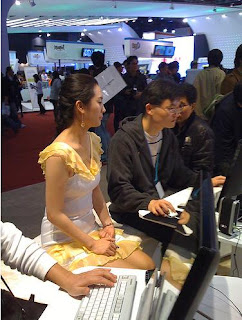Since I get some hits from people looking to teach in Korea for the first time, it's worth mentioning that there are recruiters
misrepresenting the exchange rate and pay scale. Using one US dollar equals one thousand won was good enough as a rough estimate up until a few months ago, but don't be fooled today that 2.5 million won is equal to $2,500 per month. According to XE.com today, one dollar is 1,484 won, meaning 2.5 million won is actually US$1,667 per month. It goes without saying that you should investigate the exchange rates of your new country yourself, and I'd suggest skipping over recruiters who are either too sleazy or too lazy to accurately represent their jobs.
Moving right along, there's a piece in the
Korea Times today about English Program in Korea. It's basically an advertisement---EPIK advertises on the main page of the
KT, too---same as that
POLY School article from a couple of days ago, but I guess this one is somewhat newsworthy since it's the government's system for putting foreigners in schools. I was surprised "unqualified" never popped up in the piece, but with a title like "
EPIK Seeks Passionate Foreign Teachers" I guess they were after something else. Actually, one thing did catch my eye:
Currently, EPIK recruits only native-English speakers from the United States, Canada, United Kingdom, Australia, New Zealand, South Africa and Ireland.
But it plans to allow those who can speak English fluently from countries adopting English as official language from next year at the earliest.
It will deploy 608 English-teaching positions at elementary and secondary public schools and training centers in six metropolitan cities and seven provinces across the country for the next spring semester.
The program teachers will receive 1.5-2.5 million won per month according to their degrees and teaching certificates and can receive entry and settlement allowance and free single furnished housing. Successful candidates will conduct English conversation classes with Korean co-teachers.
They're opening it up to residents outside the Big 7, then, to include people from Singapore, Hong Kong, India, and
many others.
What really jumped out at me, though, was the salary: 1.5 million to 2.5 million won per month. You can view the
pay scale on the EPIK website, which shows that they include members of the TALK program in that breakdown. Recruits via the TALK program have completed two years of college, and their salaries range from 1.5 to 1.7, depending on location. New teachers at the lowest level of the pay scale can earn 1.8 million won per month, while the highest possible salary is 2.7 million won per month. Those at the highest pay scale work in the provinces, have over two years' experience, have been with the same school for more than one year, and have one of the following: Master's degree, a CELTA, a TEFL certificate, or a Bachelor's in Education or English.
I'm not with EPIK but am in a public school, and as I'm at the second-highest level I earn 2.4 million won per month. It's the same rate I earned last year, and only 300,000 won more per month than I got when I arrived in Korea in July, 2005. Given the exchange rates, I actually earn $500 per month less than I did three years ago. The EPIK pay scale has remained unchanged since 2004, when I first began looking at jobs in Korea: the lowest level is still 1.8.
One of the complaints I always make is that there are no opportunities for professional development for native speaker teachers in Korea. We just wrapped up our yearly workshop this past weekend. That's right, a yearly workshop, and while it was very informative, that it was but three hours out of my year reflects how important our classes are considered in the grand scheme of English education. Korean English teachers, on the other hand, attend demonstration clases every semester, have frequent meetings with their colleagues, and have opportunities to attend immersion camps. Some even do a semester-long stint at an education university in Korea, followed by a month studying at an overseas university. English teachers may also pursue a Master's degree overseas, with half the cost covered by the education office.
Another complaint that goes hand-in-hand with that is that for all the talk about "unqualified" this and "we need more qualified teachers" that, there is no incentive for teachers to possess or require said qualifications. It was by coincidence that another story about "unqualified teachers" came out today, this one reporting that about
half the foreign teachers in Seoul are "unqualified." In an abstract sense teachers with certification or advanced degrees are still filling the same roles as 22-year-olds with a freshly-printed Biology degree. Whether you're fresh off the boat or have been in the game for two decades, you're still seeing your students once in a blue moon, still serving largely decorative roles, still given a minimum amount of support and guidance, still having classes cancelled for grammar review, and still lowest on the totem pole. Hell, you're not even considered an English teacher, but are designated "native speaker assistant teacher." Some will say that with those with teaching credentials back home will have a greater sense of professionalism and job satisfaction, but anecdotal evidence suggests otherwise. Moreover I have to question how those qualifications, tailored for different countries and settings, prepare the teacher for the challenges of the Korean public school.
And in terms of renumeration, experienced teachers---who are likely over 30 given the number of years it takes to amass the paperwork---are earning in the neighborhood of $30,000 per year, and only slightly more than teachers with no experience or training. Money is hardly everything, that's true, but the older we get the more responsibilities we have to other people, and the more we think about saving for the future. I'm insecure about my salary now, at 27; I'm sure that insecurity is amplified as the years add up. Pursuing a master's degree in TESOL or in a related field was once appealing to me, but I can't justify going back home for two years and coming back in my 30s to do the same job, and for the same money, I'm doing now.
You can easily find side-by-side comparisons of Korea, Japan, Taiwan, and China, traditionally the four most-popular destinations in East Asia for English teachers. Korea doesn't have the name recognition of Japan or China, and teachers in Korea have typically done more complaining than their peers in other countries. However, it was always the case that Korea was the best deal. Japan is cool but it's expensive. Taiwan is cool but you have to find your own place and have to fly yourself over. China is all right but you only make a few hundred dollars a month. But you don't need me to tell you that Korea is quickly losing whatever edge it had. One of the biggest attractions of Korea was the low start-up costs, as airfare was fronted before arrival and the apartment was already provided. Now, it's become common practice to reimburse airfare a month or two after arrival, and teachers usually have to pay what is basically "runner's insurance," a fee of 300,000 won per month to the school that will be returned to the teacher at the completion of the contract. Adding greatly to the start-up costs are the in-person embassy interviews and, for Canadians, the
Vulnerable Service Sector checks required of new applicants. If stagnant salaries and shrinking vacations weren't enough, the increasing start-up costs are enough to frighten new teachers away.
I was interested in Korea in college and didn't really give the other countries a second thought. I still like Korea and personally don't have the energy or motivation to start over in some other country, or spend my formative years chasing a favorable exchange rate all over the globe. But first-time teachers will be less quick to dismiss Japan or Taiwan out-of-hand, or sneer at the lower salaries offered in China.
And that's to say nothing of the frustrations teachers feel here, not simply when they're getting ripped off by shady employers. I've seen the higher salaries in Korea referred to as "hazard pay" because of all the staring, taunts, and abrasiveness to be found. I'm not going to get into the extent to which those things exist, but nevertheless that was a prevailing opinion. And again I'm quoting the wisdom of the masses when I say that people were willing to sacrifice pay in order to experience the culture of places like Japan, China, or Thailand, and that Korea was rather boring in comparison. Korea has plenty to offer, of course, but first-time teachers or those adventurous enough to move will have some serious thinking to do.
EPIK has been debated to death on Dave's and other forums, with people saying that all its negatives are simply endemic to teaching in Korea. It's had just about nothing but negative attention from critics, though, and I always wondered why anyone would sign up for the program. I almost did, back in 2004, because I was hung-up on having a job already lined up before I graduated. I wasn't aware of how many schools there are in Korea, and how easy it is to find a job. Google will help you find more accounts of EPIK; a lengthy critique from Michael Hurt is available here, titled "
EPIK as Case Study: Why Korean-Style Management Sucks." It's the conclusion of a three-part series on, among other things, the business of English education and native speakers' role in it, and was preceded by "
The Phantom Menace" and "
Attack of the Clones."
Also take some time to read some articles from 2004 on the state of EPIK: "
Teachers give bad grades to state-run ESL program" and "
How schools fail to teach English." Pretty damning stuff.
I'm really not sure what can be do about these ridiculously-low salaries from EPIK and other schools, salaries and benefits packages that have remained unchanged from years ago. Fewer teachers are coming here or staying, meaning schools are turning to college students, to more
Korean "lecturers," and to teachers from other countries to fill the void. You would think Korea would be doing everything it could to court teachers, but rather they're offering low salaries and welcoming applicants with all kinds of expensive and time-consuming visa regulations. However, as long as people accept these positions, the schools will feel no pressure to change.
It's easy, very very easy, to bitch and moan about what's wrong without offering any solutions. Granted, nobody has ever asked my opinion on English education, and many resent me for giving it unsolicited, but I plan to do a lengthy post in the near future about improvements that can be made to better incorporate native speakers and communicative skills into the scheme of things. While there are many rewarding aspects of living in Korea, I don't think it's too pessimistic to suggest that it's becoming harder to justify a lengthy teaching career here. Ironic that the longer we stay in Korea and the longer we learn, the less valuable we become. What is it they say about doing the same thing over and over and expecting a different result? I don't think it's "hope."


















































